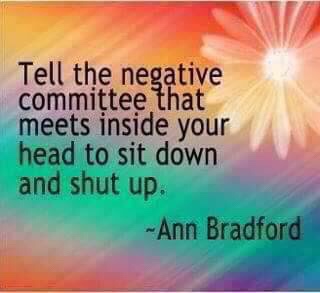My friends say our worries & fears come from the not-so-helpful “committee in my head.” I call those negative voices “whispered lies.”
For instance, for too many years I believed “If I want to be liked, I must look good.” This whispered lie made me constantly worried about my appearance and behavior.
A few more examples include:
- “I’ll never have enough money.”
- “I always sabotage my success.”
- “Relationships just don’t work for me.”
- “We could all be happy if only Dad would stop drinking.”
Although many of our whispered lies concern ourselves, they often focus on our children, spouses, friends, or relatives—for instance, the last example about the father’s drinking.
Other distressing beliefs involve institutions, as in “If the government would just change this policy, we’d all be better off.”
Even though it might be true that Dad ought to stop drinking or the government should make changes, these events have no control over your own happiness.
You can find peace of mind under any circumstance because you’re in charge of what you think about.
Most of our worries are fueled by false stories installed into our minds long ago, just waiting for opportunities to be confirmed.
Wayne Dyer wrote that everything our brain “knows” is based on past experiences. Therefore, when an event resembles—even in a small way—an old painful one, our mind interprets the new event according to the long-standing negative belief.
Since most whispered lies live largely in our subconscious, we’re often unaware of them.
To illustrate the power of my own “negative committee’s” lies, consider why I failed at romantic love so many times during my twenties and thirties. I wanted to believe that love was possible for me, but my past had taught me the lie “I’m not worthy of love.”
This belief lived so strongly in my mind that, even when a man loved me deeply, I couldn’t believe it was true. After several months, I would become convinced that he wasn’t fulfilling my needs. These worries made me so demanding that I soon snuffed out all the happiness and joy of new love. When it ended, I’d tell myself, “I just don’t deserve love!”
Until I got honest and started healing my faulty thinking, I had no hope of enjoying a happy relationship. I’m so grateful for the therapy, recovery, psychological strategies, and spiritual tools that gave me freedom from my false beliefs.
As a result I’m a pretty happy camper most days — AND I’ve been happily married for 31 years. So what if it’s my 4th husband??? He’s fabulous!
To learn how to win independence from your own committee’s whispered lies, check out my award-winning book 50 Ways to Worry Less Now (Amazon 5 stars), Audiobook, and Ebook HERE https://GigiLanger.com/buy/






